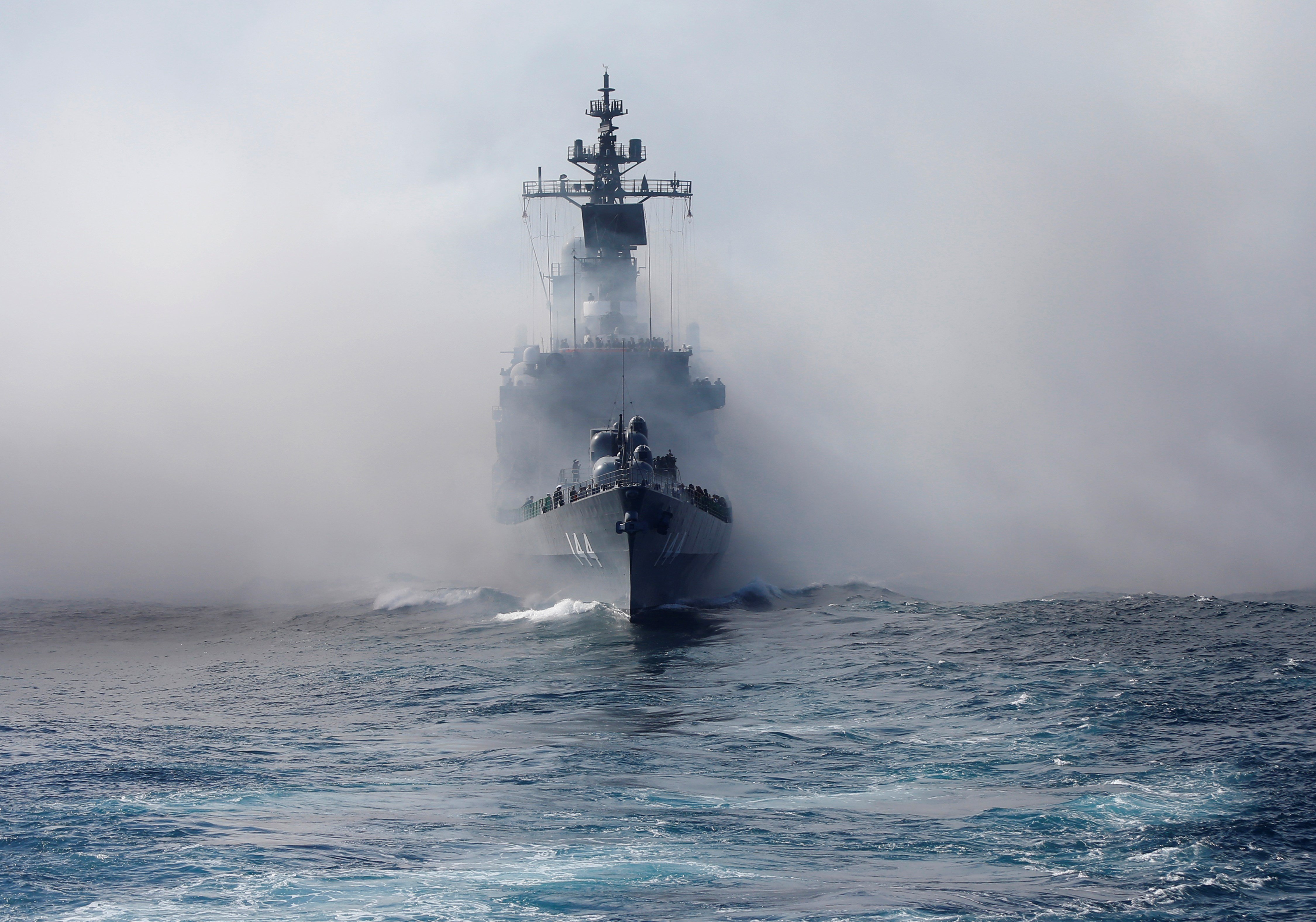Beijing: Japan is straining tensions to abolish pacifist constitution
According to a Chinese official, Japan has been vigorously hyping the 'Chinese threat' and continuously developing its missile programs. Tokyo intends to abolish its pacifist constitution and return to the policy of military expansion.
-

Japan Maritime Self-Defense Force (JMSDF) escort ship "Kurama" appears from the smoke during a fleet review in the waters off Sagami Bay, south of Tokyo, Japan, Sunday, Oct. 18, 2015 (AP Photo/Shizuo Kambayashi)
Japan has persistently hyped the "Chinese threat" as an excuse to abolish its pacifist constitution and return to the path of military expansion, Chinese Foreign Ministry spokesperson Wang Wenbin said on Thursday.
"China has repeatedly stated its position on this issue. For a certain period of time, Japan has been vigorously hyping the 'Chinese threat' and continuously developing its missile programs and so-called retaliatory strike capabilities, which is a pretext for creating offensive armed forces," the diplomat said at a press briefing.
Tokyo wants to abolish its pacifist constitution and return to the policy of military expansion, according to Wang. These actions send a concerning signal to the international community that Japan wants to challenge the global order that was established after the end of World War II.
"Japan, a country that bears serious historical responsibility for what it has done to its Asian neighbors, should seriously think about the history of its aggression, respect the security interests of its Asian neighbors and immediately stop erroneous actions that hype the so-called security threats that surround it as a pretext for building up its own military power," Wang added.
The Japanese defense ministry announced on Wednesday that it requested a record-high military budget for 2023 of almost 5.6 trillion yen ($40.1 billion). This sum only contains the costs that the ministry was prepared to disclose. Experts and media believe that the actually requested budget stands at 6.5 trillion yen. Japan's defense budget for 2022 is 5.4 trillion yen, which was also a record-high.
The undisclosed part of the budget request reportedly contains the expenses for the modification of the Japanese ground-to-ship missiles, the so-called Type 12 anti-ship missiles. The ministry plans to increase the flight range of Type 12 so they can become part of a system that allows targeting bases in China or North Korea while staying outside the reach of its weapons.
Additionally, the strengthening of missile and air defense is planned. Funds will be allocated for research in the field of hypersonic missile interception, as well as for the development of drones, the development of electronic warfare, and cybersecurity.
Read more: Japan, 'Israel' agree on military collaboration
Prior to WWII, Japan had a long history of military interventions in the Pacific. The enormous crimes imperialist Japan committed against the people of China during the second Sino-Japanese war from 1937-1945 were monstrous, costing possibly between 10 and 25 million Chinese civilians' lives.
These crimes have not been forgotten, especially since Japan has continuously refused to give any real apology for the crimes, provide compensation to the victims, or take a clear stand against this part of its history.
For example, former Japanese Prime Minister Shinzō Abe visited the Yasukuni Shrine, which pays homage to convicted Japanese war criminals on several occasions.
The fact that Japan never had a “bourgeois revolution” left remnants of the old feudal state in place, the emperor for example.
Within quite a short period of time, Japan emerged as a major economic power, and with it went military might, as it expanded beyond its borders building its own empire in the east.
Since the early 1990s, NATO and Japan have been engaged in dialogue and cooperation, often referred to as ‘partners across the globe – with which it is developing relations, and NATO’s top leadership has consistently described Japan as a ‘natural partner’ over the years.
Moreover, Japan's geostrategic position and its role as the primary American ally in Asia were thought to ensure Washington's sustained commitment to its defense.
Just yesterday, Russia launched the grand opening of the Vostok-2022 strategic military exercises at the Sergeevsky training ground in Russia's Primorsky Region.
Although Washington officials have not expressed much besides that it would "keep its eye open" given the "nature" of the countries participating, this had sent a clear signal to Tokyo that it would be responsible for its own defense.
Hence, Japan's security policy is transiting from heavy reliance on the US and the accommodation of Beijing to a more independent posture and harder balancing against China.
This is especially reflected by an unprecedented reform of the Japanese armed forces and an increasingly proactive regional policy, as observed by Wang.
Earlier this month, China urged Japan to remain true to its commitment related to building a world free of nuclear weapons, as Beijing had doubts about Prime Minister Fumio Kishida's pledge to do so on the 77th anniversary of Hiroshima's atomic bombing.
Wang Wenbin said that despite its pledge, the only country in the world that suffered nuclear attacks in war has been sheltered under the US nuclear umbrella and is opposed to Washington relinquishing the no-first-use policy regarding its nuclear weapons.
"Some (Japanese) politicians even claim to have nuclear sharing with the U.S. side, claiming that the U.S. deployment of nuclear weapons (in Japan) should not be a taboo," Chinese Foreign Ministry spokesperson Wang Wenbin said in a press conference held in Beijing.
Read more: Putin: No winners in nuclear war

 5 Min Read
5 Min Read








